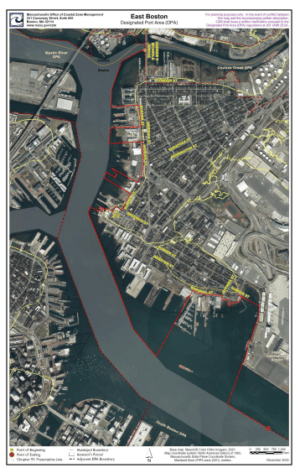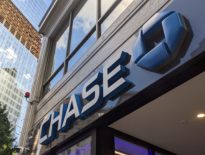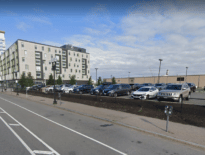State regulators rejected a proposal backed by Boston Mayor Michelle Wu that would have lifted limits on the types of development allowed on 97 acres of the East Boston waterfront.
The state Office of Coastal Zone Management decision keeps all but a small section of parcels within a designated port area, restricting development to maritime and industrial uses.
The Boston Planning & Development Agency originally sought the zoning changes in 2020. Wu also supported the attempt to expand development options in the neighborhood, while encouraging development that improves coastal resiliency.
But the CZM decision, issued Dec. 23, removes less than 9 acres of the requested 97-acre area from the designated port area: specifically sections of Jeffries, Marginal and Sumner streets.
Acknowledging Boston officials’ support for the changes, CZM said it will work with the city to study how affordable housing, commercial development and resilient infrastructure can be accommodated alongside marine and industrial uses.
“CZM applauds the inclusive local planning processes which have engaged local residents and stakeholders in visioning a future for the waterfront that could include these uses,” CZM Director Lisa Berry Engler wrote in the decision.
Sections of Border Street will remain in the designated port area because they have a shoreline that is developed with piers, wharves and bulkheads and the land is suitable for industrial uses, including proximity to the Massachusetts Turnpike and Route 1A, the CZM decision stated.
Boston Harbor Now has advocated relaxing waterfront zoning under the designated port area rules to allow for 21st-century uses including wind power and “blue tech” marine companies.
“We know there have been changes in water-dependent uses, and we expect to see more,” said Alice Brown, chief of policy and planning for Boston Harbor Now.
Communities also have the option of bypassing the CZM review and trying to remove properties from designated port areas through legislation.
In July, state Rep. Daniel Ryan, D-Charlestown, submitted legislation removing the 43-acre Mystic Generating Station property in Everett from a designated port area. The power plant will be decommissioned in 2024 and the Kraft family has expressed interest in developing a soccer stadium for the New England Revolution on the site.
CZM recently removed a separate 23-acre section of East Boston waterfront on Chelsea Creek from a designated port area. The October decision clears the way for developer Cargo Ventures to pursue a 1.1 million-square-foot industrial development on Route 1A known as East Boston Gateway.









